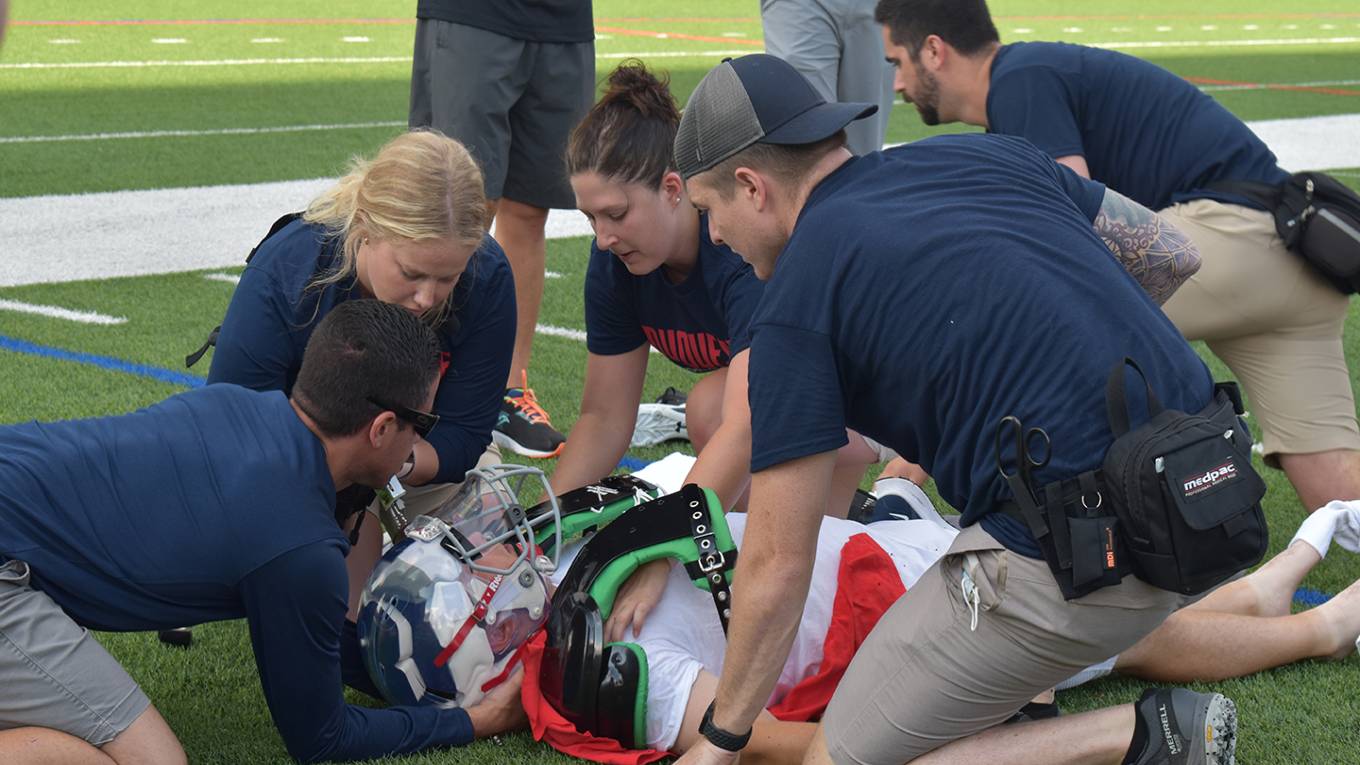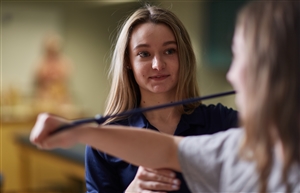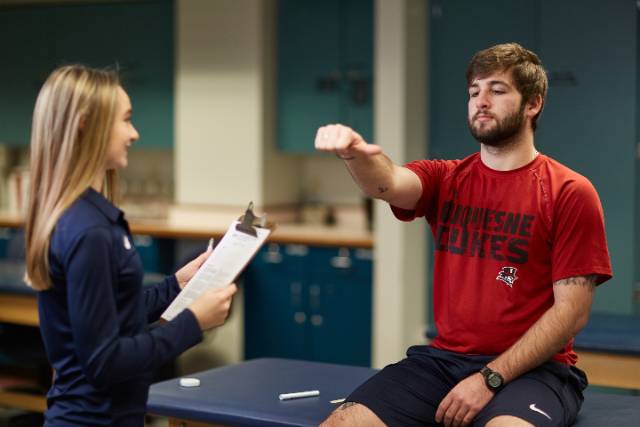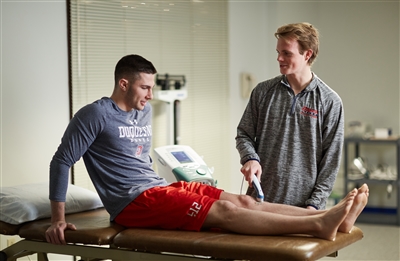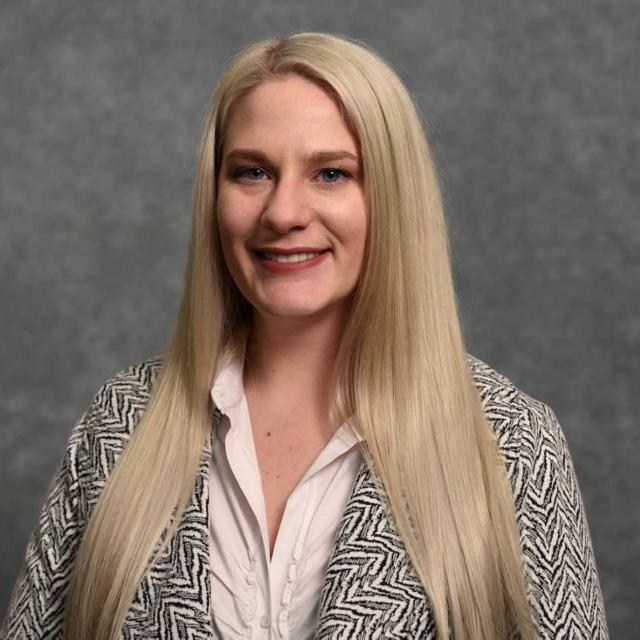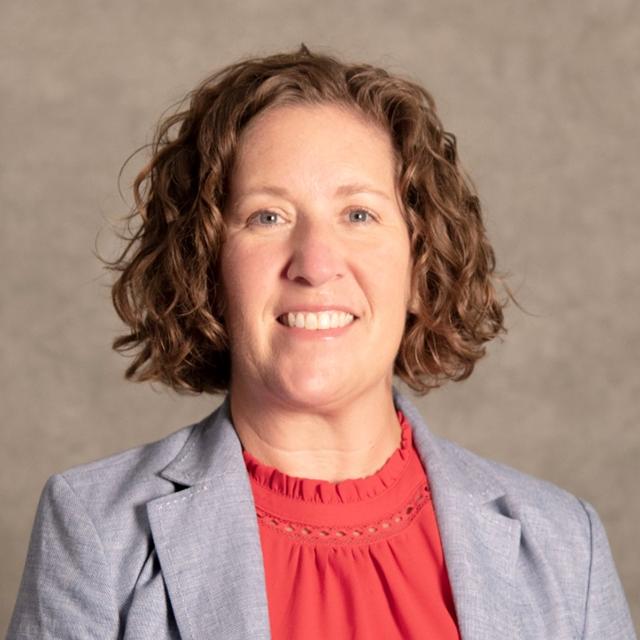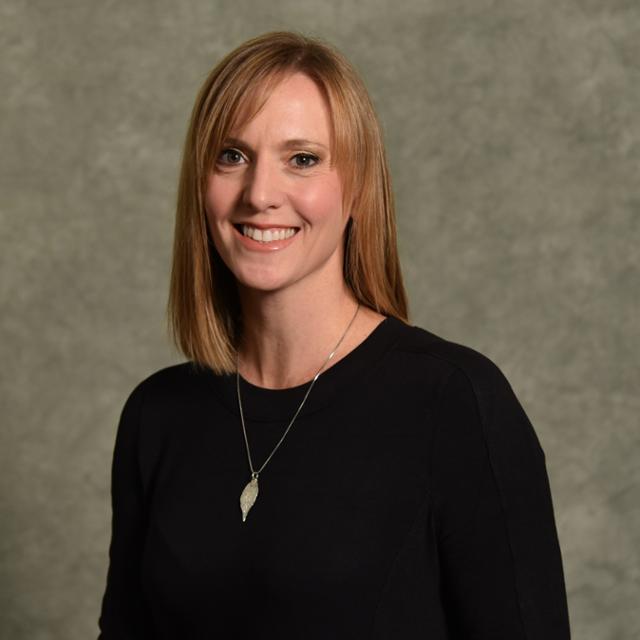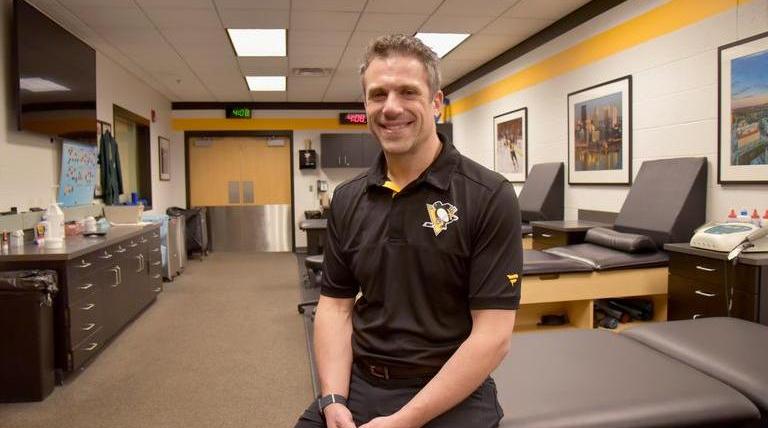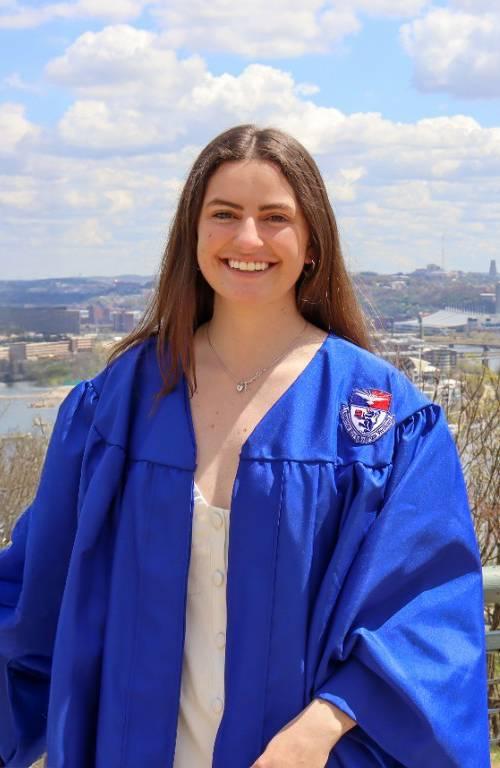Athletic Training
Duquesne University's strong liberal arts tradition and excellence in Health Sciences serves as the foundation for our dynamic Athletic Training Program curriculum. Our curriculum is designed to provide our students with a comprehensive Athletic Training experience, rooted in the basic sciences and health sciences. Our aim is to educate and train students to provide evidence-based, patient-centered care. For over 30 years, we have been providing our students with a high-quality educational experience that emphasizes critical thinking and decision-making and preparing them for the ever-changing healthcare market.
Students enrolled in our accelerated Master's degree program will earn a Bachelor of Science (BSHS) and a Master of Science in Athletic Training (MSAT) in five years. During the Pre-Professional Phase (Years 1-3) students will be immersed in a comprehensive health and exercise science curriculum, which will set the foundation for the Professional Phase (Years 4-5). The Professional Phase coursework will focus exclusively on athletic training and provide students with rich learning experiences both in the classroom and clinically. Graduates of our program are prepared to practice as certified athletic trainers, which involves providing healthcare to physically active individuals in a range of practice settings.
Athletic Training students are presented with a high-quality liberal arts education, a comprehensive health and exercise science foundation, as well as opportunities to obtain a superior education in both the clinical and didactic components of the Athletic Training Program. Our philosophy is that students are to be given every opportunity to reach their full potential as students, individuals, and healthcare professionals and that at all times, students and faculty are required to strive to maximize those potentials. We demand excellence, expect excellence, and are never satisfied to accept the status quo. The Athletic Training Program also firmly believes in evidence-based practice and encourages all members of the Program in their development, advancement, and dissemination of research and scholarship that underpins the practice of medicine, Athletic Training, and other health sciences
Program Information
Duquesne University Athletic Training program combines classroom instruction, clinical experiences, and faculty support for future certified athletic trainers.
Program Type
Major
Degree
Bachelor's, Master's
Duration
5-year
Required Credit Hours
97 credits Pre-Professional Phase / 66 credits Professional Phase
Framework
Learning Outcomes
- Patient Centered - Students will utilize evidence during clinical decision making to enact person centered care.
- Individual - Students will develop as autonomous clinicians through application of personal wellness and leadership skills.
- Global - Students will demonstrate awareness of the larger context of healthcare and the ability to collaborate with other professionals.
Curriculum
To receive a Bachelor of Science in Health Sciences, students in the five-year entry-level program must satisfactorily complete a minimum of 120 credit hours and all requirements. To receive a Master of Science in Athletic Training, students in the five-year entry-level program must satisfactorily complete a total of 160 credit hours and all program requirements.
Our curricular areas of distinction include orthopedic injury management, manual therapy, concussion & spine injury care, and interprofessional education and collaborative practice. We have a strong science-based curriculum, including cadaver anatomy with dissection.
There are four full-time faculty members with clinical expertise and specialty areas are committed to developing competent and confident athletic training professionals prepared to engage in clinical reasoning and provide optimal care.
- BIOL-111/L Biology I/Lab (4/0 credits)
- PHIL-XXX Philosophy course (3 credits)
- BRDG-101 Writing & Analysis (3 credits)
- COMM-102 Public Speaking (3 credits)
- PSYC-101 Introduction to Psychology (3 credits)
- HLTS-120 Elements of HS, Info Lit & Term (3 credits)
- BRDG-102 Writing & Literature (3 credits)
- HLTS-115 Intro to Health & Exercise Science (1 credits)
- EQ-XXX Essential Questions Seminar (3 credits)
- BRDG-105 Intro to Ethical Reasoning (3 credits)
- Elective (3 credits)
- BIOL-207/8 Anatomy & Physiology I/Lab (3/1 credits)
- CHEM-131/L Fundamentals of Chem I/Lab (5/0 credits)
- HLTS-225/L Current Concepts in Sports Medicine/Lab (3/0 credits)
- MATH-225 Introduction to Biostatistics (3 credits)
- BIOL-209/10 Anatomy & Physiology II/Lab (3/1 credits)
- HLTS-311/L Test & Measures (3 credits)
- THEO-XXX Theology course (3 credits)
- Cultural Fluency course (3 credits)
- Elective (3 credits)
- ENGL-316W Healthcare & Literature (3 credits)
- HLTS-437/L Functional Kinesiology/Biomechanics/Lab (3/0 credits)
- PHYS-201/L Physics for Life Sciences I/Lab (3/1 credits)
- PBHL-301 Intro to Epidemiology (3 credits)
- PBHL-318 Healthcare Delivery & Organization (3 credits)
- HLTS-406W/L Nutrition & Weight Management/Lab (3/0 credits)
- HLTS-408W/L Physiology of Exercise/Lab (3/0 credits)
- HLTS-410 BLS/EMT Practicum (3 credits)
- THEO-253 Health Care Ethics: Theology or PHIL-252 Health Care Ethics: Philosophy (3 credits)
- Elective (3 credits)
- ATHT-501/L Immediate Care & Prevention (4 credits)
- ATHT-525 Evidence-Based Methods in Healthcare (2 credits)
- ATHT-530/L Introduction to Therapeutic Interventions (3 credits)
- ATHT-502/L Orthopedic Assessment & Treatment – Lower Extremity (3 credits)
- ATHT-511 Clinical Practicum I (3 credits)
- ATHT-515/L Contemporary Evaluation (2 credits)
- ATHT-550/L Therapeutic Interventions – Modalities (3 credits)
- HLTS-570/L Cadaver Anatomy (4 credits)
- ATHT-500 Research & Evidence Integration I (2 credits)
- ATHT-503/L Orthopedic Assessment & Treatment – Upper Extremity (3 credits)
- ATHT-512 Clinical Practicum II (3 credits)
- ATHT-516/L Diagnostic Tools/Advanced Skills (3 credits)
- ATHT-601 Considerations for Global Health (3 credits)
- ATHT-504/L Orthopedic Assessment & Treatment -- Spine (2 credits)
- ATHT-505 Non-Orthopedic Pathology & Pharmacology (3 credits)
- ATHT-606 Patient-Centered Care & Behavioral Health (3 credits)
- ATHT-535 Organization & Administration (3 credits)
- ATHT-611 Clinical Practicum III (5 credits)
- ATHT-510 Research & Evidence Integration II (1 credit)
- ATHT-560/L Manual Therapy (2 credits)
- ATHT-615 Athletic Training Seminar (3 credits)
- ATHT-610 Research & Evidence Integration III (3 credits)
- ATHT-612 Clinical Practicum IV (3 credits)
Students will engage in a series of clinical education experiences across their two years in the Professional Phase with an extensive network of clinical education preceptors. These experiences, which will include 2 immersive experiences, are designed to provide students with numerous opportunities to further develop, refine, and apply their knowledge and skills in a clinical environment.
Program Details
Admissions Pathways, Requirements, and Cost of Attendance
Duquesne offers multiple admission pathways to earn your Athletic Training degree. The majority of our students begin their AT journey with us as freshmen, however, there is always room for transfer or post-baccalaureate students to join along the way!
As a direct admit program, students are admitted directly into the athletic training major in their first year. Admitted students must have a minimum high school QPA of 3.0 (including 4 units in English; 1 unit in social studies or language, 7 units in mathematics and science; and four elective units), evidence of extracurricular activities during high school, and be able to meet all of the medical and performance/ technical standards of the program. As part of the application process, students are required to complete a personal essay. With respect to our admissions process, we are a test optional program and therefore SAT/ACT are not required as part of your application. However, test scores will considered as part of the academic award/scholarship process if submitted. International students must have a TOEFL score of at least 550 and demonstrate the ability to communicate orally in English.
Students may also transfer into the Athletic Training Program prior to the professional phase. Students interested in transferring into the program must have a minimum GPA of 3.0 and have demonstrated “B” grades or better in science courses. Students must also be able to meet medical technical standards of the program and will be required to complete a personal essay describing their interest in athletic training and the program.
During the pre-professional phase of the program Athletic Training, students are required to acquire a minimum of 25 hours of clinical observation/experience in athletic training before being admitted into the professional phase of the program. Students who meet all pre-professional program requirements will be admitted into the professional program.
Students interested in pursuing our Athletic Training Program as a post-baccalaureate Master's degree program must meet the following requirements for their application to be reviewed. An undergraduate degree from a four-year, degree-granting institution, a GPA of 3.0 or higher on a 4.0 scale and completion of pre-requisite course work with no less than a "C" grade in all prerequisite courses which includes:
- One course with lab in Biology and Chemistry
- One course in Physics
- Three (3) credits in Introduction to Biostatistics/Statistics
- Three (3) credits in Psychology
- A two course sequence (six [6] credits) in Anatomy/Physiology with labs
- Kinesiology or Biomechanics (three [3] credits)
- Exercise Physiology (three [3] credits)
- Nutrition (three [3] credits)
Two professional references (references will not be accepted from a family member or friend)
Documentation of a minimum of 25 hours of athletic training shadowing experience. These experiences must be with a licensed athletic trainer and should be documented using the clinical observation form.
If offered admission, the following will also be required:
- CPR certification (adult, infant, and child) for Health Care Providers
- Verification of all Pre-Clinical Health Requirements
- Physical exam
- Verification of Health Insurance
Apply for graduate admission via ATCAS.
Duquesne University is more affordable than you might think. Don't just take our word for it. Independent sources - including U.S. News and World Report and Washington Monthly - all rank Duquesne as a Best Value university.
AT Tuition Structure
Faculty and Staff
Making It To The Show
Upcoming Events
There are no upcoming events to display for this calendar.
Accreditation
Commission on Accreditation of Athletic Training Education
Duquesne University's Athletic Training Program is accredited through the Commission on Accreditation of Athletic Training Education (CAATE). The program was granted continuing accreditation in 2017 and will undergo its next comprehensive review in the 2026-2027 academic year. The program applied for and was granted approval by the CAATE to change the level of its degree to a Master's degree in 2021.
Board of Certification Results
Our Athletic Training students have historically achieved tremendous success on the national board exam. Duquesne's Three-Year (2020-2022) Aggregate First Time Passing Rate is 92% and the Three-Year Overall Passing Rate is 100%.
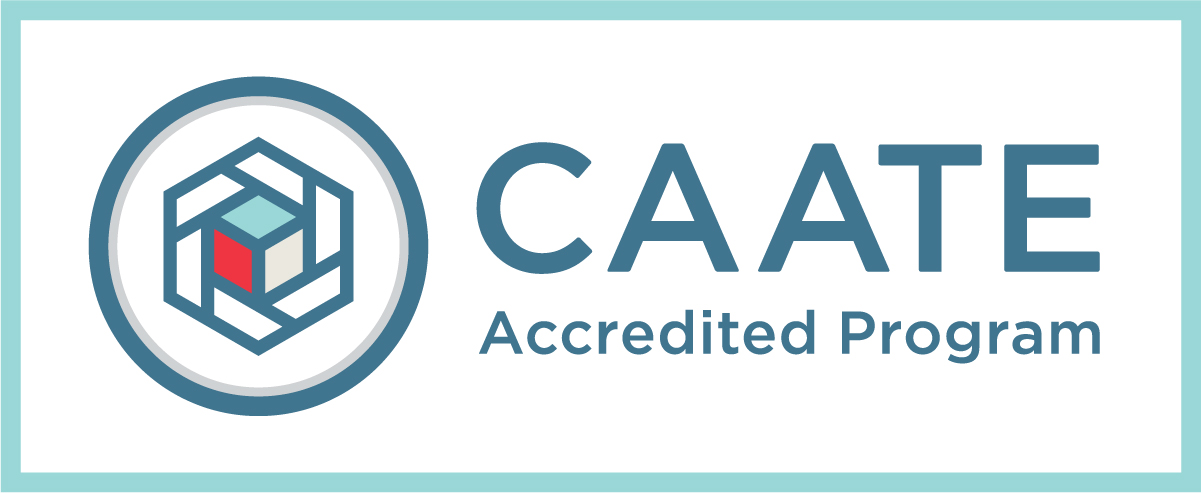
CAATE Accreditation Program
Additional information related to BOC passing rates/graduation rate/placement rates


